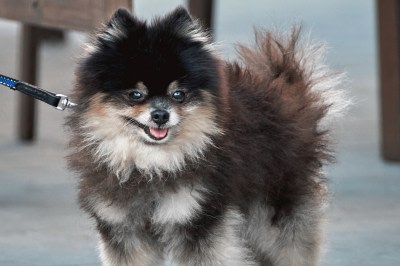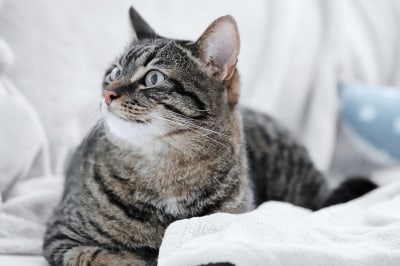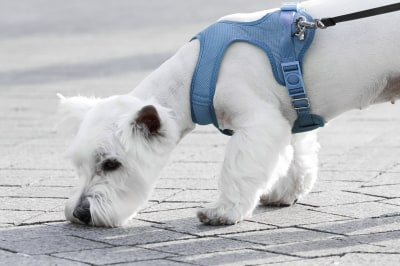Comprehensive Dental Care for Cats & Dogs
Routine vet dental care is a critical component of your pet's oral and overall health, but most cats and dogs don't get the oral hygiene care they need to keep their teeth and gums healthy.
At our Oklahoma City veterinary hospital, we provide complete pet dental care for your cat or dog, from basics such as dental exams, teeth cleanings, and polishing to dental X-rays and surgeries.
We provide education to pet owners on home dental care options that work for their pets.

Pet Dental Surgery in Oklahoma City
We understand that being told your pet needs dental surgery can be overwhelming. We strive to make this process as stress-free as possible for you and your pet.
We'll do everything we can to ensure your pet's experience with us is comfortable and easy.
In addition to routine teeth cleaning, we provide dental X-rays and tooth extractions for cats and dogs.
Pet Teeth Cleaning & Exams
Much like your annual checkup at the dentist, your cat or dog should come in for a pet dental examination at least once a year. Pets who are more prone to dental problems than others may need to see us more often for oral health care.
Putnam North Animal Hospital can assess, diagnose and treat dental health problems in cats and dogs.
-
Symptoms
If you notice any of the following symptoms in your pet, it's time for a dental checkup.
- Tartar buildup
- Loose and/or broken teeth
- Extra teeth or retained baby teeth
- Bleeding from the mouth
- Bad breath
- Pain or swelling in or around the mouth
- Reduced appetite or refusal to eat
- Abnormal chewing, drooling, or dropping food from the mouth
- Discolored teeth
-
Assessment
A thorough pre-anesthetic physical assessment will be completed for your pet before the dental exam.
We will perform bloodwork for all patients prior to anesthesia and may recommend additional testing, such as chest radiographs, based on individual needs.
Once your pet is under anesthesia, we will conduct a complete oral examination (tooth by tooth) and obtain dental radiographs.
-
Treatment
Next, the teeth are cleaned using a piezo dental scaler and a complete vet evaluation is performed. The vet will finish the cleaning process with hand instruments as needed (including under the gum line).
We then use an Air N Go prophy jet air polishing handpiece to polish all the teeth and apply a fluoride treatment. This is the least abrasive way to polish your pet’s teeth and helps slow future plaque development. Lastly, we apply cold laser treatment to the gum tissue to help reduce inflammation and pain and help speed up the healing process.
-
Prevention
During discharge, we will discuss implementing teeth brushing and other oral care methods that you can perform at home. We can also recommend products that can help improve your pet's oral health.
FAQs About Pet Dental Care
Here are some of the most frequently asked questions from our clients about pet dental care.
-
Why do pets need their teeth cleaned?
Our pets can develop periodontal disease or tooth decay as a consequence of poor oral health.
Just like in humans, when animals eat, plaque sticks to their teeth and can build up into tartar if not brushed away regularly.
This can lead to infections in the mouth, periodontal disease, tooth decay, and even loose or missing teeth. That's why regular dental care is essential to preventing pain or disease in the gums. -
How can I tell if my pet has oral hygiene issues?
Did you know behavior may be an indication of oral health problems? If your pet is experiencing dental problems, they drool excessively (and the drool may contain pus or blood), or you may notice them pawing at their mouth or teeth. They may also yawn excessively, grind their teeth, or stop grooming sufficiently.
Other signs of oral health problems include bad breath, swollen gums, and tooth discoloration. Some pets may even suffer from pain that keeps them from eating. Read more about symptoms to the left under Pet Teeth Cleaning & Exams. -
What long-term problems can poor oral health potentially cause in my pet?
Besides causing problems ranging from cavities and bad breath to severe periodontal disease, oral health issues and conditions can lead to disease in the liver, kidney, heart, and other areas throughout your pet's body.
Cysts or tumors may develop. Your pet may also not feel well in general (if you've ever had a toothache, you know how it can affect your mood!). In addition, diseases related to oral health conditions can shorten the lifespan of your pet and cause significant pain.
This is why regular dental care is so essential to animals' physical health and wellbeing. -
What happens during a pet teeth cleaning appointment?
During your pet’s regular oral exam, the vet will examine his or her mouth and look for oral health conditions or any symptoms needing treatment.
The vet will clean tartar and other debris from your cat's or dog's teeth. If cavities, gingivitis, or other conditions need to be addressed, the vet will explain these to you and provide advice on which actions you should take.
In some cases, surgery will be needed to treat serious conditions. Your pet will be provided with anesthesia before their dental procedure to ensure they are comfortable and do not experience any pain. However, special care will be needed post-surgery.
If you notice any of these symptoms, schedule a dental appointment with us. -
What should I do at home to keep my pet’s teeth clean between dental appointments?
At home, you should brush your pet's teeth on a regular basis and give them dental chew toys. These will help eliminate plaque.
Do not allow them to chew on things that will damage their teeth, such as bones, toys or objects that are too hard. Always contact your vet with any questions or concerns regarding your pet's oral health.
Contact Us to Book a Dental Checkup
Veterinary Dental Care: Anesthesia & Your Pet's Oral Health
Cats and dogs do not understand what is going on during dental procedures and will often react to dental procedures by struggling or biting.
Similar to the anesthesia provided to nervous or anxious patients by dentists, our Oklahoma City vets provide all of our patients with sedation and pain medication before beginning, as well as anesthesia throughout the procedure. This puts less stress on the animals and allows us to X-ray their mouth as needed.



